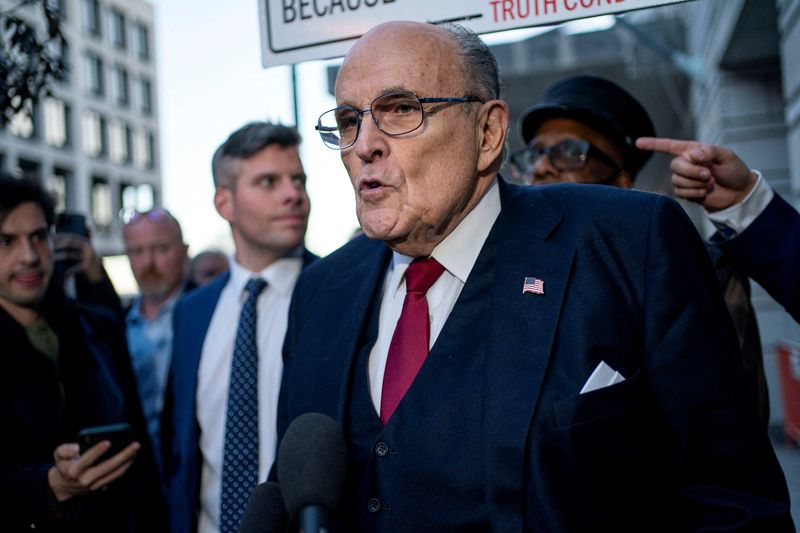By Dietrich Knauth
NEW YORK (Reuters) -A U.S. bankruptcy judge on Friday gave Rudy Giuliani limited permission to challenge a $148 million defamation verdict won by two former Georgia election workers whom he had falsely accused of fraud after former Republican President Donald Trump's 2020 election loss.
U.S. Bankruptcy Judge Sean Lane said at a court hearing in White Plains, New York, that he would allow Giuliani to seek a new trial to challenge the amount of damages awarded to Wandrea "Shaye" Moss and her mother, Ruby Freeman, but not pursue a full appeal. But first, Lane said, Giuliani will have to provide more information about who is paying his legal bills.
Gary Fischoff, an attorney for the former Trump lawyer, told Lane that Giuliani cannot pay the $148 million verdict, much less have anything left over to pay others who have sued him.
Giuliani, who filed for bankruptcy in December, has few assets other than some real estate, and he is earning limited income from his podcast and radio show, according to Fischoff.
"He's currently suspended from the practice of law, so he can't earn income right now as a lawyer," Fischoff said. "There's no pot of gold at the end of the rainbow, and the debtor is going to give full disclosure."
Giuliani has told the bankruptcy court that third-party legal defense funds are footing the bill for cases he is facing related to his 2020 election claims, and that they have already paid $847,000 to cover his defenses. Fishcoff said Giuliani intends to provide further information on his funding sources next week.
Giuliani's bankruptcy filing came on Dec. 21, just days after the former New York City mayor was ordered to pay $148 million to Moss and Freeman, who faced a deluge of threats after Giuliani falsely claimed they were engaged in voting fraud.
That filing automatically stops litigation from moving forward against him, including efforts to collect the judgment and other election-related defamation lawsuits.
In addition to the defamation verdict, Giuliani faces a crush of debts stemming from his prior work as Trump's personal lawyer.
He asked the bankruptcy court for a limited reopening of the election workers' lawsuit to allow him to challenge the verdict, arguing that U.S. bankruptcy law's prohibition on continuing litigation is meant to protect debtors like him.
'DESPICABLE THINGS'
Rachel Strickland, an attorney for Moss and Freeman, opposed Giuliani's request, arguing that he is trying to have it both ways by using bankruptcy to stop their collection efforts while continuing to attack the judgment they won in federal court in Washington.
Giuliani "said and did despicable things," and he has continued to defame Moss and Freeman even after the defamation judgment and his bankruptcy filing, Strickland said.
Moss and Freeman have also argued that Giuliani's bankruptcy should not allow him to duck the money he owes them, as judges have ruled that defamation penalties cannot be discharged in bankruptcy if a debtor has engaged in "willful and malicious" conduct.
Lane said the compromise brokered in court would protect Giuliani's appeal rights without giving him "carte blanche" to attack the defamation verdict.
The major creditors in Giuliani's bankruptcy case are people who have sued him, including Moss and Freeman, Democratic President Joe Biden's son, Hunter Biden, a former employee, Noelle Dunphy, and voting machine company Smartmatic.
None of the other lawsuits have resulted in verdicts yet. Fischoff said the Freeman and Moss judgment would "swamp" Giuliani and prevent him from paying anything to other creditors.
Giuliani's other debts include roughly $1 million in federal and state taxes, and $1.4 million in unpaid legal fees connected to his work as Trump's personal lawyer.

Giuliani also faces criminal charges of election subversion in Georgia, along with Trump and more than a dozen other co-defendants. He has pleaded not guilty.
His law license has been suspended in New York and he faces disbarment in Washington.